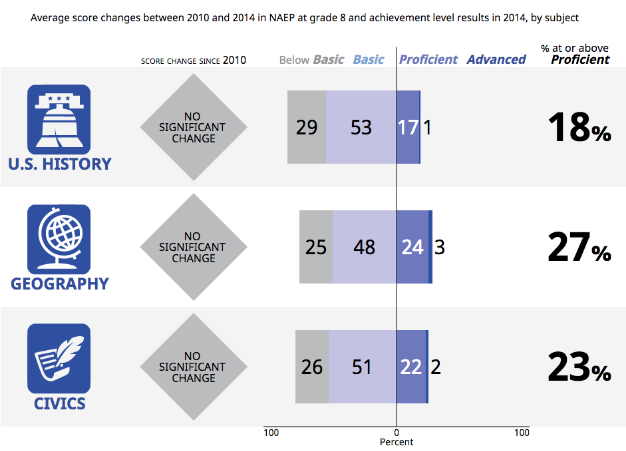"Nation's report card" reveals stagnant student achievement
The "nation's report card" arrived this week, and someone's getting grounded.
Only 18 percent of 8th-graders were rated "proficient" or "advanced" in their understanding of U.S. history, according to the results of the 2014 National Assessment of Educational Progress. Only 27 percent demonstrated a strong grasp of geography. And only 24 percent scored highly on the civics exam.
Roughly half of all 8th-graders demonstrated a "basic" understanding of all three subject areas, and roughly a quarter were graded "below basic."
The results marked no significant change from 2010, the last time the test was administered.
Over 29,000 eighth graders from 400 schools participated in the 2014 exam, answering both multiple choice and open-ended questions on one of the three subject areas. Previous NAEP assessments measured the performance of 4th- and 12th-graders as well, but budget constraints limited the scope of last year's test.
The 2014 results revealed a stark racial disparity in student achievement levels. Twenty-eight percent of white students - but only six percent of black students and eight percent of Hispanic students - were rated proficient in U.S. history. Results from the geography and civics exams showed a similar gap.
The chairman of the board that governs the NAEP assessment, Terry Mazlany, called the latest results "unacceptable" in a statement.
"Geography, U.S. history and civics are core academic subjects that must be a priority," he said. "They represent knowledge and skills that are fundamental to a healthy democracy. The lack of knowledge on the part of America's students is unacceptable, and the lack of growth must be addressed."
Some policymakers, wary that high student achievement in other countries could put the U.S. at a competitive disadvantage in the future, have recently stressed the importance of improving education standards. Many have paid particular attention to achievement in STEM fields (science, technology, engineering, and mathematics,) but that emphasis has some experts worried other subjects are getting short shrift.
"Qualitative and quantitative data show that the social studies have been marginalized over the past decade in U.S. schools," said Michelle Herczog, the president of the National Council for Social Studies, according to the Tulsa World newspaper. "Emphasis on raising test scores in reading, mathematics and science has caused educators to prioritize instruction, professional development and resources supporting these subjects, particularly in elementary school."
The report card arrived as lawmakers are mulling a reauthorization of the Elementary and Secondary Education Act, a bill that could have broad implications for student testing and achievement. The Senate Health, Education, Labor, and Pensions committee unanimously approved a bill earlier this month that would greatly scale back the federal government's ability to affect states' education policies. It would allow states to decide whether to evaluate teacher performance and how it should be measured. It would require states to improve failing schools but provide them with more flexibility to do so than they enjoy under the current system, which spells out four prospective turnaround methods. It would extend the requirement for states to include student testing results in their accountability systems but allow each state to determine how much weight that testing should carry.
Perhaps most politically important is the bill's clarification that the federal government cannot interfere with each state's ability to set academic standards. That measure is intended to placate critics who say current law allows the federal government to promote "common core" standards by tying federal grant money to a state's adoption of those standards. The new law would urge states to develop "challenging" curriculum but forbid the federal government from making the adoption of federal-backed standards a precondition of financial support.
If you're curious about whether you're better-informed than an eighth-grader, you can find a list of sample questions on the NAEP website. Here are a few of those questions.
U.S. History
Which of the following people were most likely to become indentured servants in the English colonies?
- A. Convicted criminals sent to the colonies to work off their sentences
- B. Puritans seeking religious freedom and a job working for a religious family
- C. Poor workers willing to trade their labor for passage to America
- D. Freed slaves who could not yet afford to buy their own farms or start businesses
Who ruled the Spanish colonies in the Americas?
- A. Governors appointed by the king
- B. The wealthiest merchants in the area
- C. Missionaries appointed by the Catholic Church
- D. Democratically elected councils representing each region
Geography
Which of the following countries is located on the Horn of Africa?
- A. Sudan
- B. Niger
- C. Botswana
- D. Somalia
The Hoover Dam blocked the Colorado River, creating which of the following recreational lakes near Las Vegas, Nevada?
- A. Lake Mead
- B. Fort Peck Lake
- C. Lake Powell
- D. Lake of the Ozarks
Civics
What is one responsibility that modern Presidents have that was not described in the Constitution?
- A. Commanding the armed forces
- B. Granting pardons
- C. Appointing Supreme Court justices
- D. Proposing an annual budget to Congress
Answers: A, A, D, A, D
